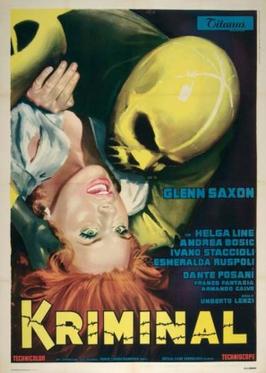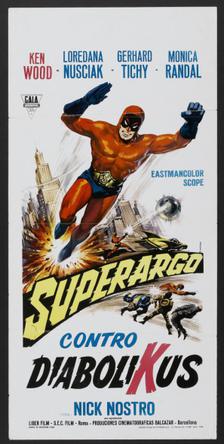A list of films produced in Spain in 1966 (see 1966 in film).
A list of films produced in Spain in 1966 (see 1966 in film).
| Title | Director | Cast | Genre | Notes | ||
|---|---|---|---|---|---|---|
| 1966 | ||||||
| La caza | Carlos Saura | Alfredo Mayo, Emilio Gutiérrez Caba, Ismael Merlo | Drama | Won Best Director at Berlin | ||
| The Diabolical Dr. Z | Jesús Franco | Estella Blain, Mabel Karr, Howard Vernon | French-Spanish co-production [1] [2] | |||
| Kriminal | Umberto Lenzi | Roel Bos, Helga Liné, Andrea Bosic | Italian-Spanish co-production [3] | |||
| Nueve cartas a Berta | Basilio Martín Patino | Emilio Gutiérrez Caba | Drama | Influenced by Nouvelle Vague and 60's new cinemas | ||
| Noche de vino tinto | José María Nunes | Escuela de Barcelona | ||||
| Con el viento solano | Mario Camus | Entered into the 1966 Cannes Film Festival | ||||
| The Texican | Lesley Selander | Audie Murphy | Western | |||
| La Dama del Alba | Francisco Rovira Beleta | Dolores del Río, Yuliette Villar | ||||

Mario Bava was an Italian filmmaker who worked variously as a director, cinematographer, special effects artist and screenwriter, frequently referred to as the "Master of Italian Horror" and the "Master of the Macabre". His low-budget genre films, known for their distinctive visual flair and stylish technical ingenuity, feature recurring themes and imagery concerning the conflict between illusion and reality, as well as the destructive capacity of human nature. He was a pioneer of Italian genre cinema, and is regarded as one of the most influential auteurs of the horror film genre.

Lamberto Bava is an Italian film director. Born in Rome, Bava began working as an assistant director for his director father Mario Bava. Lamberto co-directed the 1979 television film La Venere d'Ille with his father and in 1980 directed his first solo feature film Macabre.

Umberto Lenzi was an Italian film director, screenwriter, and novelist.
Bruno Mattei was an Italian film director, screenwriter, and editor who directed exploitation films in many genres, including women in prison, nunsploitation, zombie, mondo, cannibal, and Nazisploitation films. Mattei's films often followed popular genre trends of the era. Mattei continued work as a director primarily in the Philippines until his death in 2007, just before he was to enter production on his fifth Zombie film.

Enzo Girolami Castellari is an Italian film director, screenwriter and actor.

Fabio Testi is an Italian actor. After growing up witnessing film work done around Lake Garda, Testi entered the sets of the film and began work as a stuntman and a double on set, where he worked as a stuntman on The Good, the Bad and the Ugly. Testi continued stunt work and getting roles in low budget genre films until he was cast in Vittorio De Sica's film The Garden of the Finzi-Continis. Following this film, Testi became a star in Italy, appearing in some artistic films by Giuseppe Patroni Griffi and Claude Chabrol. Testi also continued to work in poliziotteschi genre films in the 1970s as well as a few gialli, and gained infamy for his publicised relationships with actresses Ursula Andress and Charlotte Rampling.

Fernando Di Leo was an Italian film director and script writer. He made 17 films as a director and about 50 scripts from 1964 to 1985.
Sergio Salvati is an Italian cinematographer who was born in Trastevere, a working-class neighborhood of Rome, Italy. His father, Aldofo Salvati, was already a key grip in the early days of Italian cinema, and through his father's contacts Sergio began his career developing negatives in a small photographic laboratory in Rome, the SPES directed by Di Ettore Catalucci.
Alberto De Martino was an Italian film director and screenwriter. Born in Rome, De Martino started as a child actor and later returned to the cinema where worked as a screenwriter, director and dubbing supervisor. De Martino's films as a director specialised in well-crafted knock-offs of Hollywood hit films. These films were specifically created films in Western, horror and mythology genres which were developed for the international market. The Telegraph stated that his best known of these film was probably The Antichrist. The Antichrist capitalized on the box-office appeal of The Exorcist (1973) and in its first week in the United States earned a greater box office than Jaws.
Stelvio Massi, sometimes credited "Max Steel", was an Italian director, screenwriter and cinematographer, best known for his "poliziotteschi" films.

Kriminal is a 1966 superhero film directed and written by Umberto Lenzi. The film is about a thief and murderer called Kriminal who escapes from a prison and is chased after by Inspector Milton. It was followed by a sequel, Il marchio di Kriminal.

Superargo Versus Diabolicus is a 1966 superhero film written and directed by Nick Nostro. It had the sequel in 1968, Superargo and the Faceless Giants directed by Paolo Bianchini.
Luigi Carpentieri (1920-1987) was an Italian assistant director (1940-1949) and film producer (1947-1968). Together with Ermanno Donati, he founded the production company "Athena Cinematografica", which in 1960 became "Panda Cinematografica". All films produced by [[the company were genre films.
Ermanno Donati was an Italian film producer. Along with Luigi Carpentieri, Donati won the Nastro d'Argento award for Best Producer for the film The Day of the Owl.